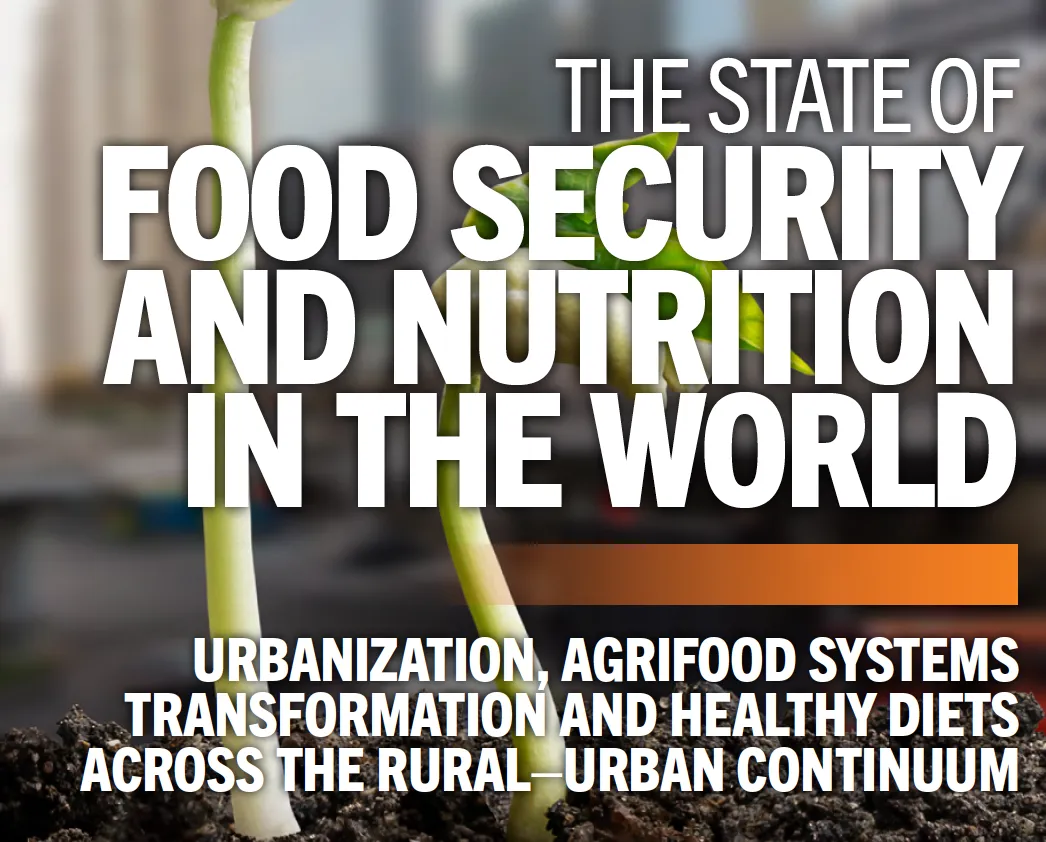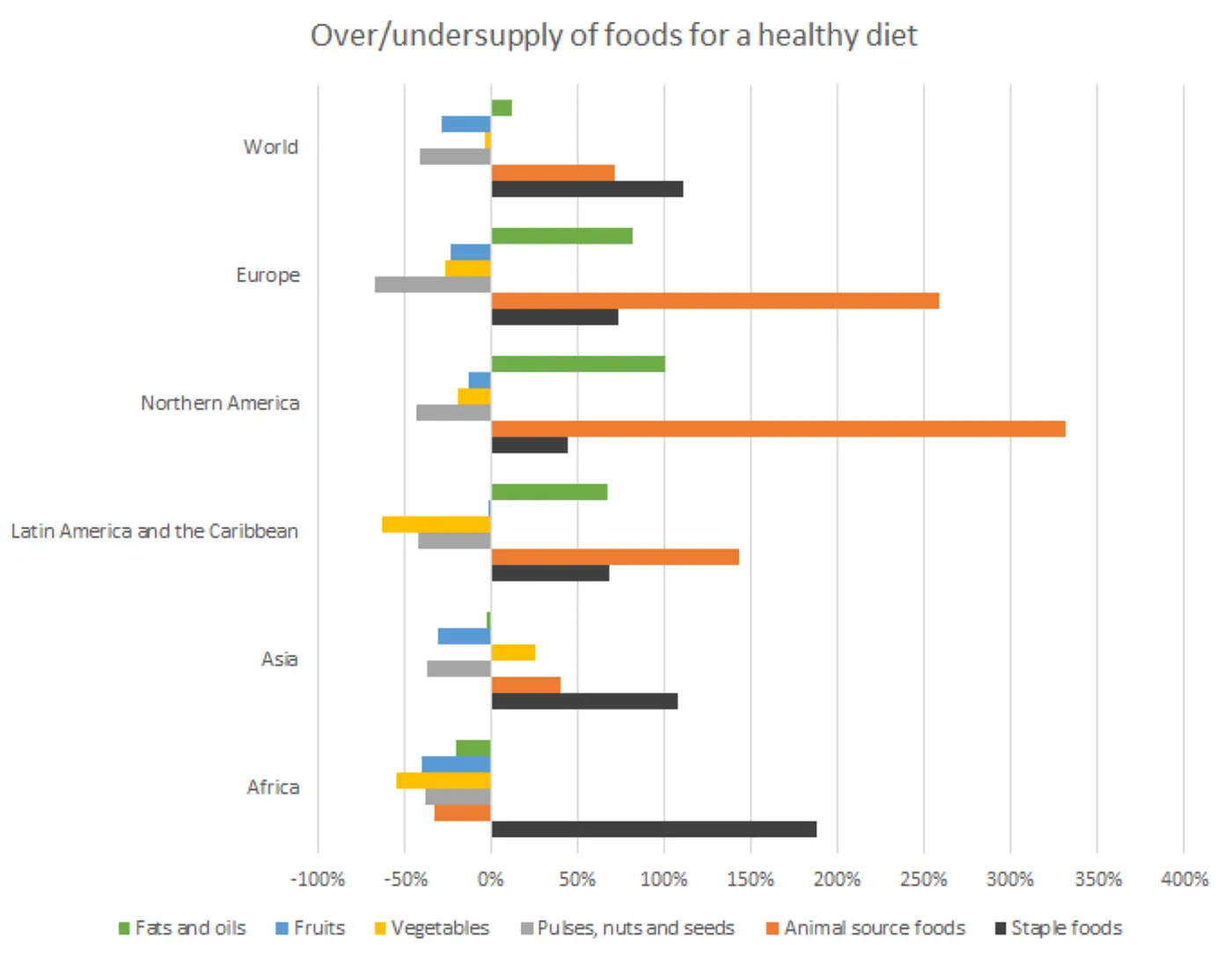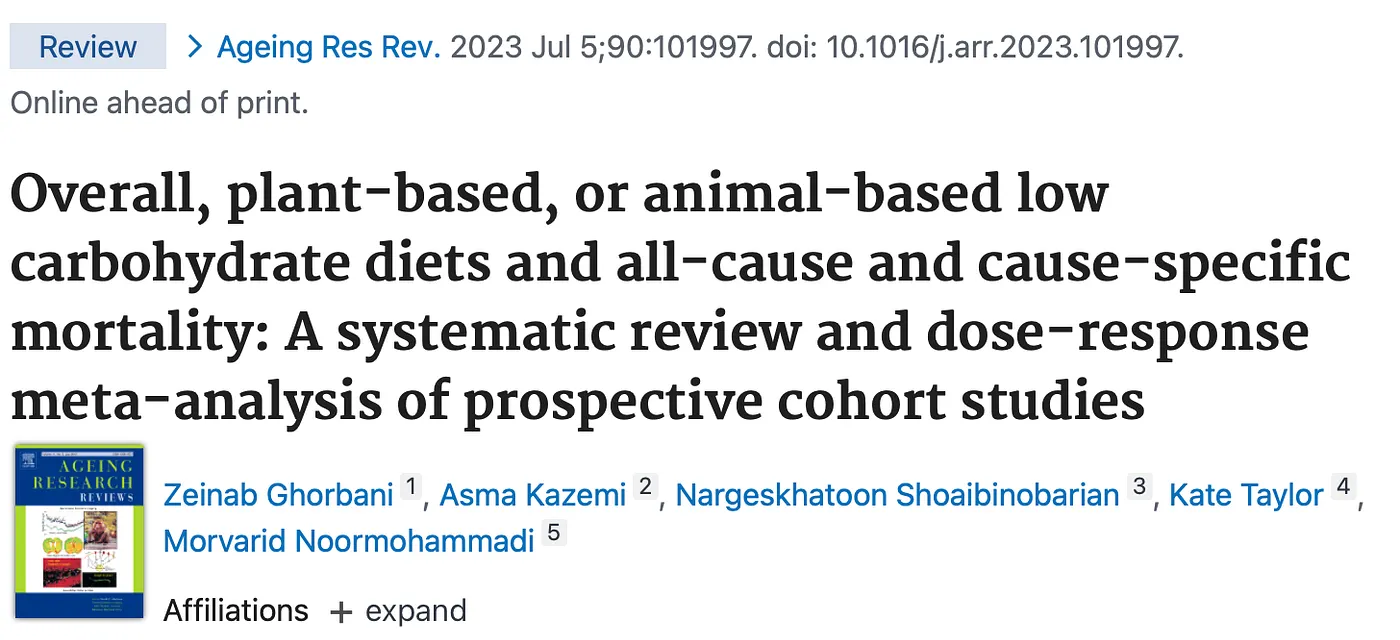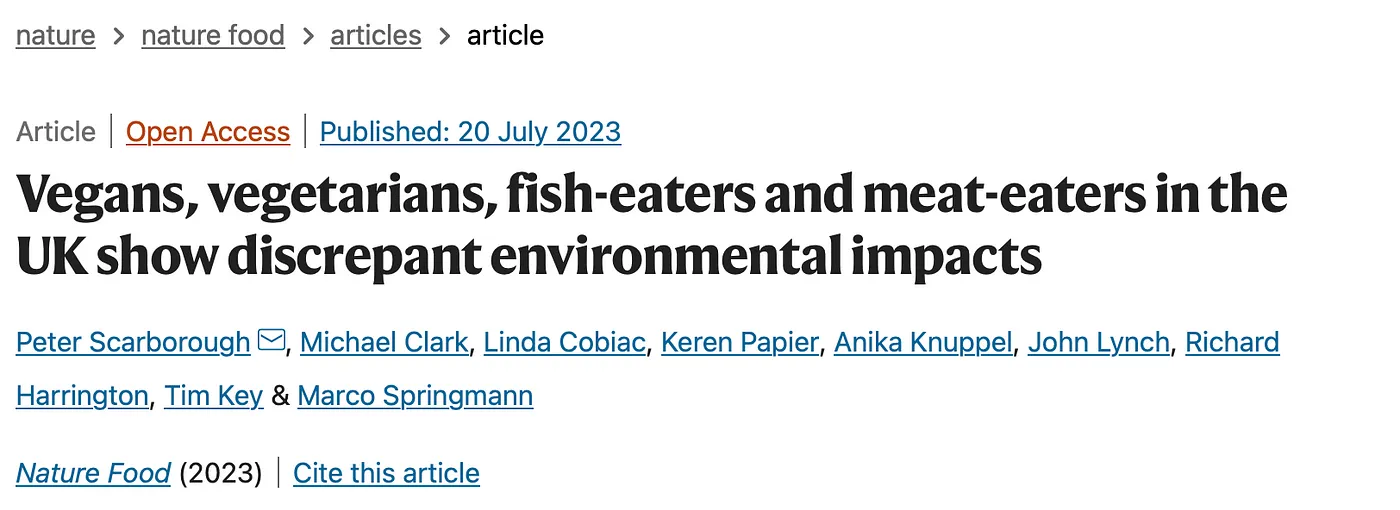Review of the plant-based nutrition news July 2023
This month I cover the latest report on global nutrition, how to do a low-carb diet well, plant-based diets for kidney disease, diet and brain health, the latest results from the Plant for Joints study, the Nordic Nutrition Recommendations and a HUGE study on the impact of food choices on the environment.

THE STATE OF FOOD SECURITY AND NUTRITION IN THE WORLD: FAO’s annual report is now available. Key messages on page 18 of 316 are worth browsing. Sadly, despite producing enough food to feed at least 10 billion people, between 691 and 783 million people worldwide faced hunger in 2022. It is projected that almost 600 million people will be chronically undernourished in 2030, with food insecurity disproportionately affecting women, people living in rural areas and mainly occurring in Asia and Africa. More than 3.1 billion people in the world — or 42 %— were unable to afford a healthy diet in 2021. Most of the people unable to afford a healthy diet live in Southern Asia and in Eastern and Western Africa. Throughout the globe, there is a general shift in behaviour to consuming more processed food and less of the healthy whole plant foods.
What seems key to me is that we are significantly overproducing animal-sourced foods with a massive under supply of healthy plant foods; legumes, vegetables and fruits.


WHAT IS THE OPTIMAL RATIO OF PLANT TO ANIMAL PROTEIN? For me, the optimal is zero animal protein. However, this is a useful paper to understand the impact on diet quality, long-term health and environmental health when shifting from an animal-based to a plant-based diet. The study used data on the typical diet of people living in France and used reference values for nutrients and disease burden risks for foods. The results showed that there was a wide range in the proportion of protein that can be obtained from plant sources whilst still maintaining a good quality and nutritionally adequate diet. Obtaining 70-80% of protein from plant sources resulted in nutritional adequacy without worrying about a short fall in nutrients. When more than 80% of protein is obtained from plant sources, nutrients that have to be addressed include calcium and iodine (most often obtained from dairy sources), vitamin B12, iron, zinc and DHA/EPA (most often obtained from fish). However, the authors clearly acknowledge that these nutrients can be obtained through supplementation and fortification where relevant. Notably, meeting protein requirements were not found to be an issue at any level of plant protein intake, which dispels the prevailing myth around protein adequacy on a plant-based diet. The lack of dairy in a 100% plant-based diet results in risks related to calcium and iodine inadequacy. But these issues are easily overcome with the widespread availability of fortified dairy alternatives, the use of iodised salt or an iodine supplement. The paper also acknowledges the improvement in diet quality as plant sources of protein, from beans, lentils and nuts, are increased relative to animal sources, especially when replacing red meat in the diet. This will result in improved health outcomes and is significantly better for planetary health.
If as a minimum we could get everyone to obtain 80% of their protein from plant sources, I think this would be a win!

VEGETARIAN DIET AND CHRONIC KIDNEY DISEASE: There is now growing evidence for the use of meat-free diets for the prevention and management of chronic kidney disease (CKD). This has been the reason for our collaboration with the BDA renal specialist group in producing three factsheets on plant-based diets and chronic kidney disease, dialysis and kidney transplant. I also summarised recent data in my review from April 2023.
This study is a nice addition to the evidence. The systematic review focused on randomised controlled trials (RCTs), which compared the effects of a vegetarian diet (experimental) and a standard omnivore diet (comparator) in terms of the estimated glomerular filtration rate (eGFR) in patients with CKD (indicator of kidney function). Four RCTs with a total of 346 participants were included. The analysis found that in two of the studies, there was an increase in eGFR (i.e. improvement in kidney function) whereas in the smaller two studies, there was no change in eGFR. However, of note, the two studies that did not show a benefit each included less than 20 participants, and one only lasted for 4 weeks. Of the two studies that did show a benefit, one included 107 participants (lacto-ovo vegetarian vs Mediterranean diet), and one included 207 (Keto analogue-supplemented vegetarian very low–protein diet (KD) vs. conventional low–protein diet (LPD).
This adds to the abundance of observational data demonstrating that meat-free and plant-based diets in general, preserve kidney function and reduce the risk of progression of kidney failure in people with established kidney disease. These randomised studies to some extent support this hypothesis. When you then add the additional benefits of plant-based diets for managing high cholesterol, high blood pressure, cardiovascular disease and type 2 diabetes, it seems that we are at the stage where plant-based diet should be the default diet recommended by renal physicians and dietitians.

LOW-CARB DIETS CAN BE HEALTHY WHEN THEY ARE PLANT-BASED: More data suggests that lowering carbohydrate consumption in the diet may be beneficial but only when carbs are replaced by plant sources of fat and protein. This new systematic review and meta analysis examined the impact of plant-based, animal-based and general low-carb diets on mortality. It included 10 prospective cohorts studies with more than 400,000 participants. Dietary data were scored according to carbohydrate content, plant and animal sources of fat and protein. Overall high adherence to a low-carb diet and animal-based low-carb diet did not have an impact on overall/all-cause mortality (neither positive or negative). However, a low-carb plant-based diet reduced all-cause mortality by 13% with each 5-point increase in plant-based low-carb score reducing mortality by 4%. In contrast, overall and animal-based low-carb diets were associated with a 14% and 16% increased risk of dying from cancer, respectively. A plant-based low-carb diet did not impact risk of cancer death. There were no positive or negative associations between a low-carb diet and risk of cardiovascular death.
So, if you want to try a lower carbohydrate diet to see if you may gain benefits for weight management or glucose regulation, then the science shows you should replace carbohydrates in the diet with plant sources of protein and fat. In general, these and prior data suggest keeping carbohydrate consumption between 40–70% of energy intake is optimal and not going too high or too low. You can read more about low-carb diets and the impact on health here. If you want to try a low-carb plant-based diet, this article will provide some pointers.

DIET AND DEMENTIA: Diets rich in plant-based foods are associated with a lower a risk of dementia. The WHO recommends a Mediterranean-style diet that also includes fish and small amounts of lean meats and dairy. This analysis of 60, 298 participants from the UK Biobank study, followed for an average 9.1 years examined the impact of a Mediterranean diet on risk of dementia, including in those at a higher genetic risk. The dietary scoring used gave positive marks for consumption of olive oil and using a higher quantity, fruit, vegetables, wine, pulses, fish, nuts and eating ‘white meat’ instead of red. Negative marks were given for consumption of red meat, animal sources of fat such as butter, sugar-sweetened beverages, sugary foods. Greater adherence to a Mediterranean diet was associated with a 23% reduction in the risk of dementia, regardless of the underlying genetic risk profile, including being an APOE ε4 carrier.
The MIND diet (a combination of the DASH and Mediterranean diet) has been associated with a lower risk of dementia. It emphasises plant-based foods, including leafy greens, berries and whole grains but still allows significant amounts of poultry and fish. A new report analysing data from three prospective cohort studies, including 18,136 participants and performing a meta-analysis including 224,049 participants, found that adherence to the MIND diet was associated with a lower risk of dementia in middle-aged and older adults, with those adhering most closely to the diet having a 17% reduction in risk of dementia.
However, these observational data have been called into question with the publication of a randomised study in the New England Journal of Medicine (NEJM) that tested the MIND diet in cohort of 604 overweight people aged 65 years or over without cognitive impairment but with a family history of dementia over a 3 year period. The comparator group continued their usual diet but were counselled to reduce calorie intake by 250kcal. After 3 years, both groups had lost weight and showed improvements in cognitive scores and MRI scan findings.
I am not sure we are ready yet to ditch the dietary interventions in general for prevention for dementia. The NEJM study however highlights the difficulty of conducting randomised controlled studies in nutrition. It is likely that 3 years is too short a follow up to show significant differences in cognitive function. In addition, the control group may well have improved their diet quality just through being part of such a study and exposed to counselling.
There is no doubt in my mind that a healthy diet centred around colourful plant foods along side other healthy lifestyle behaviours can prevent or significantly delay the onset of dementia. You can read my article here.

LIFESTYLE INTERVENTION FOR OSTEOARTHRITIS: The Plants for Joints study is one of the first studies to assess the effectiveness of a
multidisciplinary lifestyle program on disease activity in people with arthritis. Previously, the researchers have shown that the Plants for Joints program is effective for people with rheumatoid arthritis. This paper reports outcomes from the randomised study of 64 participants, mostly female, with osteoarthritis. The mean age was 64 years and the mean BMI 33 kg/m2. Half of the participants followed a 16-week lifestyle program based on a plant-based diet, exercise, and stress and sleep management. During this intervention, participants actively engaged with these four lifestyle components in 10 group meetings in groups of 6–12 participants. They also received information, videos, homework, recipes, meal plans and, when necessary, individual guidance to support their behavioural changes. The 32 participants in the control group received standard care.
The results showed that participants in the intervention group had significant benefits to their metabolic health as they lost weight, reduced their fat mass and waist circumference and lowered LDL-cholesterol and glucose levels. The intervention group also had significant improvements in arthritis symptoms, including reduction in pain and stiffness and improvement in physical functioning (31–38% improvement). The analysis suggested that these effects were not purely due to weight loss. There was also a reduction in inflammation as demonstrated by a fall in CRP levels. Participants in the intervention group were also able to reduce their use of medications.
The lifestyle programme was found to be acceptable to patients with a low drop out rate and a good level of adherence. However, the individual contribution of each lifestyle change is difficult to determine. We do know from a prior randomised study that a whole food plant-based diet alone can have significant benefits.
Overall, these results are hugely promising as they provide an evidence-based treatment option for patients that is free from side-effects and has the potential to improve symptoms of osteoarthritis along side important benefits to metabolic health. I look forward to hearing about the longer term follow-up of these participants.

NORDIC NUTRITION RECOMMENDATIONS: This document provides an extensive scientific review of the impact of various foods and nutrients on individual and planetary health and converts this to evidence-based nutrition recommendations. Overall, the recommendations endorse a shift towards the consumption of more plant-based foods, whilst reducing the consumption of animals. For example, for health reasons, the consumption of processed meat should be as low as possible and environmental reasons it is recommended that red meat consumption be less than 350g/week.
However, there are aspects that of the recommendations that could have been more nuanced in my opinion. For example, the guidance continues to recommend consumption of 300–450 g/week (cooked or ready-to-eat weight), of fish, of which at least 200 g/week should be fatty fish from sustainably managed fish stocks. However, it is not clear to me how this level of fish consumption can be achieved sustainably and there is no discussion of alternate sources of fish-derived nutrients such as algae.
The guidance on dairy consumption also seems rather retrograde; ‘Intake of between 350 ml to 500 ml low-fat milk and dairy products per day is sufficient to meet dietary requirements of calcium, iodine and vitamin B12 if combined with adequate intake of legumes, dark green vegetables and fish (varies among different species). The range depends on national fortifications programs and diets across the Nordic and Baltic countries. If consumption of milk and dairy is lower than 350 gram/day, products may be replaced with fortified plant-based alternatives or other foods.’ Cow’s dairy consumption is not essential in the diet, excludes the vast majority of the global population who are lactose intolerance, and its production has significant negative impacts on environmental health.
In addition, plant-based or vegan diets seem only to be mentioned in the context of nutritional deficiencies rather than acknowledging the co-benefits to health and the environment.
There also seems to be some controversy around the messaging on ultra-processed food consumption with suggestions that the food industry influenced a toning down of the recommendations. Read this short blog from Marion Nestle to learn more.
Overall, a step in the right direction, however, if the evidence was really being followed, I would have expected bolder recommendations and a greater shift to plant-based eating.

ENVIRONMENTAL IMPACTS OF DIET CHOICES: I don’t think we need more evidence on this topic. The science is clear. Nonetheless, this paper is an excellent addition to the subject and is described as the most comprehensive analysis of food consumption and its impact of production on the environment. It uses dietary data from the 55,504 participants of the EPIC-Oxford study, a UK-based study cohort in which around a third of participants are vegetarian or vegan and have long follow-up. The study divided participants into vegan, vegetarian, pescatarian, low (<50g/day)., medium (<50g per day) or high (>100g/day) meat eaters and analysed the impact of these dietary patterns on greenhouse gas emissions land use, water use, eutrophication risk and potential biodiversity loss using food level data from a review of 570 life-cycle assessments covering more than 38,000 farms in 119 countries. Crucially, the dataset took into account how and where a food is produced.
There is much detail in this open-access paper, but the conclusions are simple and obvious. Any reduction in animal foods in the diet has a significant beneficial impact on all aspects of environmental health that were examined. Lower meat diets have half the CO2 impact of high meat diets and vegan diets, half the impact of lower meat diets. Vegan diets, regardless of the foods consumed, has significant advantages compared to non-vegan diets with around a 50% lower impact for all indicators examined. The biggest difference seen in the study was for emissions of methane, which were 93% lower for vegan diets, compared to meat-based diets. Not that I like saying this, but if you can’t or won’t go vegan, then please substantially reduce your consumption of animals and their associated products. Every little step away from eating animal-sourced foods is a win for the planet and the environment with likely benefits for your own health and of course the animals.
I have to copy the whole concluding paragraph; ‘There is a strong relationship between the amount of animal-based foods in a diet and its environmental impact, including GHG emissions, land use, water use, eutrophication and biodiversity. Dietary shifts away from animal-based foods can make a substantial contribution to reduction of the UK environmental footprint. Uncertainty due to region of origin and methods of food production do not obscure these differences between diet groups and should not be a barrier to policy action aimed at reducing animal-based food consumption.’
Please follow my organisation ‘plant-based health professionals UK’ on Instagram @plantbasedhealthprofessionals and facebook. You can support our work by joining as a member or making a donation via the website.
